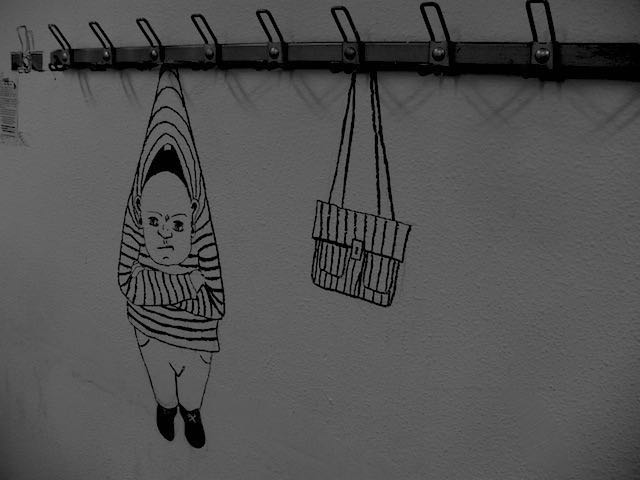Not everyone in this institution was ever able to locate “a door towards a thing.” Consider a young Frenchman who was my classmate in an Autumn 2009 seminar on the psychoanalytic concept of “the symptom.” Let’s call him Jacques; I barely knew his name even though we liked to greet each other. He had dark, long hair, a prematurely tired face, a pair of metal crutches and a disabled leg. One day we had coffee after class. He was in trouble, he said. He didn’t get what was going on in any of his seven classes. He wasn’t sure what he was going to do when the exams came.
We talked about how hard it was to see what the Department’s pedagogy had to do with its politics, as if — this is my retrospective thought — utopianism had become a very distant horizon for both of us. Jacques suggested that a small link between politics and teaching involved the friendly relations between professors and students. Our teacher in the seminar — a female doctoral student from Germany — seemed much more approachable than a traditional French professor. We used first names and there was a lot of class discussion, much more than in the classes taught by old men.
Nevertheless, I was struck by a curious fact: Jacques didn’t know the teacher’s name, just as I barely know his. He didn’t know any of his professors’ names, he explained; he was only there “for the ideas.” Jacques left Paris 8 at the end of the academic year, returning to his home town in southern France. He had been living in Paris in a cheap apartment, but had never been happy there, and hadn’t made a lot of friends, he said resignedly.
Jacques himself was a symptom of something. Perhaps of the alienation that comes of not being tightly held in the world. This alienation was a product of low status, youth, lack of Parisian social networks, and non-membership in the local world of philosophical discourse. He really believed in the intrinsic value of philosophical ideas that Paris 8 offered, but by his own account, couldn’t make sense of them. His alienation had flourished from the moment of his first encounter with the university, with its complex bureaucracy, its transient community, its “take it or leave it” attitude. His stance was emblematized by a piece of Philosophy Department classroom art where a student dangled haplessly from a coat hook.

In the French mass university, someone like Jacques did not even need to know his teachers’ names. He formed fleeting relationships with his classmates (like me), only to see them disperse. He became overwhelmed by institutional requirements that he could not master. If Jacques’s relationship to philosophy at Paris 8 offered him space for reflective self-knowledge, this was only as a bitter compensation for his exceptionally non-utopian disappointment with university life. I am not saying his experience was typical, but I believe it was not uncommon, and I bring up his case here because he shows so vividly that, in a mass university, not everyone was able to become much more than an anonymous mass subject.